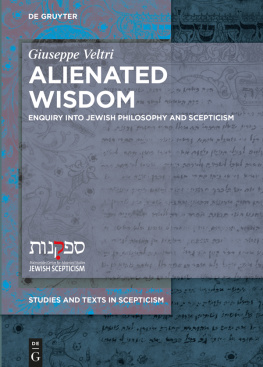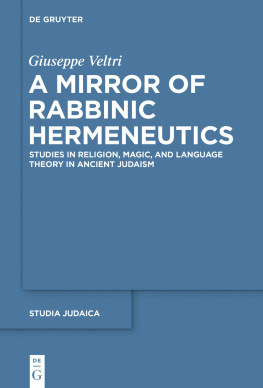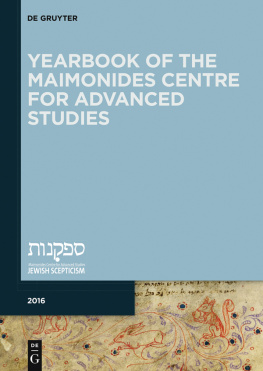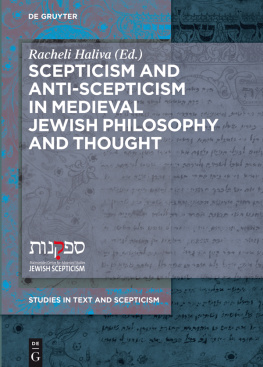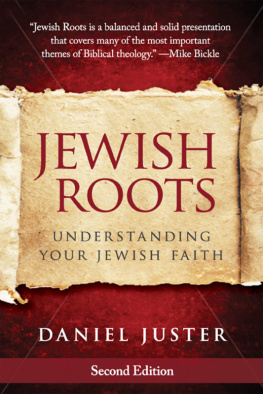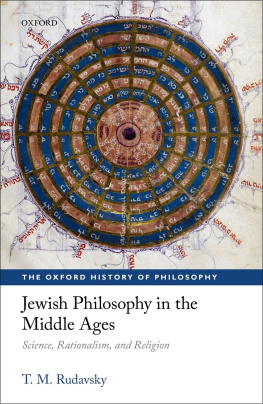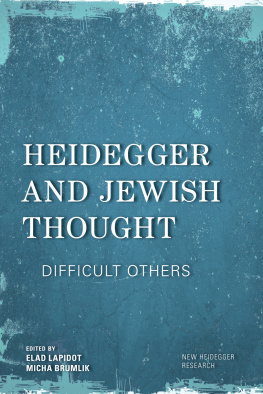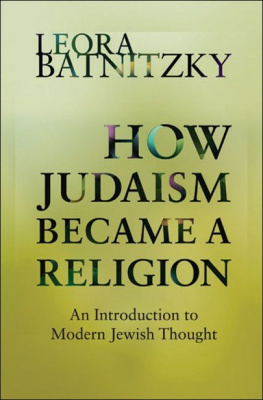Contents
Guide

Giuseppe Veltri
Alienated Wisdom
Studies and Texts in Scepticism

Edited by
Giuseppe Veltri
in cooperation with
Rachel Aumiller
Editorial Board
Heidrun Eichner, Talya Fishman, Racheli Haliva, Henrik Lagerlund, Reimund Leicht,
Stephan Schmid, Carsten Wilke, Irene Zwiep
Volume 3
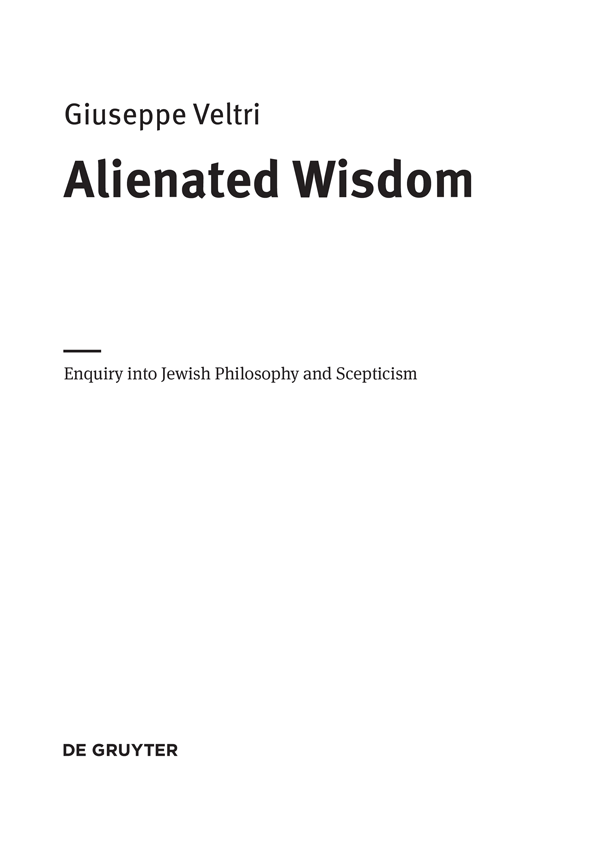
The series Studies and Texts in Scepticism is published on behalf of the Maimonides Centre for Advanced Studies

ISBN 978-3-11-060339-2
e-ISBN (PDF) 978-3-11-060449-8
e-ISBN (EPUB) 978-3-11-060368-2
ISSN 2568-9614
Library of Congress Control Number: 2018946720
Bibliographic information published by the Deutsche Nationalbibliothek
The Deutsche Nationalbibliothek lists this publication in the Deutsche Nationalbibliografie; detailed bibliographic data are available in the Internet at http://dnb.dnb.de.
2018 Walter de Gruyter GmbH, Berlin/Boston
Cover image: Staats- und Universittsbibliothek Hamburg, Ms Cod. Levy 115, fol. 158r: Maimonides,
Moreh Nevukhim, Beginn von Teil III.
www.degruyter.com
Foreword
It is customary for an author to explain the meaning of his or her title at the beginning of a book. Giuseppe Veltri, however, is rarely caught doing what is customary. He writes at the beginning of the present book that the meaning of its title will be explained in the conclusion of the book. Whats this like? Mashal le-mah ha-davar domeh? Its like a book of puzzles in which the solutions are given at the end. Do the puzzles first, get the solutions afterwards!
The Jewish tradition, Veltri teaches, is a tradition of puzzles, a tradition of questions. In this way, Veltri continues, the Jewish tradition is similar to Greek scepticism. The Greek word skepsis , he observes, means enquiry, and the sceptic/enquirer is whoever continues to raise questions.
The difference between the dogmatist and the sceptic is that the former prefers answers, while the latter prefers questions. This sceptical love of questions is found in the positive Talmudic attitude toward maloqet (debate, division, controversy, or difference of opinion). Veltri quotes a famous dictum of the Mishnah, Avot 5:17: Every debate ( maloqet ) that is for the sake of Heaven will in the end endure [ sofah lehitqayyem ]. He explains that this means that a true, disinterested scholarly debate (for the sake of Heaven) ends with an aporia, i.e. [an] endless contradiction, and thus will never cease. Debate is eternal. Questioning is eternal. Skepsis is eternal. Maloqet is itself the purpose! It is debate that endures eternally. Questions are not designed for answers, but answers are means to questions.
The medieval Jewish philosophical book that most influences Veltris text is probably Rabbi Judah Halevis dialogue, the Kuzari (1140). The genre of the dialogue, Veltri explains, is an excellent vehicle for questioning, debate, and skepsis. If philosophy depends on tradition, translation, and transmission, it is also subject to forgetfulness, error, and transformationand a reasonable individual will approach its pronouncements with no little scepticism.
The modern Jewish philosophical text that most influences Veltris text is clearly Rabbi Simone Luzzattos dialogue, Socrates (1651). Luzzattos role in the present book is considerable. As Veltri himself puts it: Simone Luzzatto is the pillar of this book because he offers enlightened definitions of Jewish philosophy, religion, cultural ghettos, monotheism, and, first and foremost, the sceptical attitude.
Before I conclude this Foreword, I must say some words about the books curious title, Alienated Wisdom.
In 1975, the classical historian Arnaldo Momigliano published an incisive little book, Alien Wisdom , that treats Hellenistic civilization. Momigliano sought to understand the cultural relationships between the Greeks and the peoples they conquered, in particular the Persians, the Romans, the Jews, and the Celts. Alien wisdom refers both to Greek wisdom (what the Jews called okhmah yewwanit ) in the eyes of the barbarians, and barbarian wisdom in the eyes of the Greeks. Momigliano found that some cultures, like the Romans and the Jews, were good at learning the secrets of alien wisdom, while other cultures, like the Greeks, were bad at it. This skill of the Romans and Jews helps explain the uncanny success of Christianity in Europe. Veltri tells us that Momiglianos term inspired his own term, alienated wisdom.
However, Veltris concept of alienated wisdom is somewhat different from Momiglianos alien wisdom. philosophy, then his philosophy is itself alienated wisdom (cf. Marxs concept of alienated labour), and those Jews or Muslims who utilized Aristotles philosophy were Semites reclaiming what was originally theirs. The question of what is or is not alienated depends on ones narrative. What does one say about an American hamburger bar in Hamburg?
In Veltris analysis, the concept of alienated wisdom is related to that of stolen wisdom ( sapientia capta ). Alienated wisdom becomes stolen wisdom or plagiarism when the appropriators claim that the wisdom originated with them.
In order to consider wisdom alienated, one must, like Judah Halevi, deny the universality of knowledge. Maimonides did not consider either his own philosophy or Aristotles philosophy to be alienated. In his Guide for the Perplexed , I, 71 and II, 11, he taught that the sciences and philosophy had flourished in ancient Israel, but were lost when the Jews were exiled and subjugated by the ignorant nations. Maimonides uses the Arabic term jhiliyya to designate the ignorant nations who subjugated the Jews. This is the same charged term used by the Muslims to designate the Age of Ignorance before the advent of Islam. If Momigliano wrote about the relationship of the conquerors with the barbarians, Maimonides referred to the relationship of the conquered with the barbarians.
Veltris Alienated Wisdom is a tour de force. It is exciting and challenging to read. At a dizzying pace, issuing insight after insight, Veltri leaps from the Hebrew Bible, to the Greek tomes of Philo of Alexandria, to the Aramaic Gemara, to Saadia Gaons Arabic Beliefs and Opinions , to Obadiah Sfornos Latin Light of the Nations , to Sara Copio Sullams Italian On the Immortality of the Soul , to Leopold Zunzs German books on Jewish history, and many more. Remarkably, he is entirely at home with all of these diverse sources. There is no trace of alienation in his wisdom.
Warren Zev Harvey
The Hebrew University of Jerusalem
Preface
According to a medieval Jewish tradition, the soul along the path of its metamorphosis must traverse successive stages that entail a loss of memory provoked by the souls shock at finding itself in abruptly new situations. In the first stage, within the heavenly world, the souls state of tranquillity shields it against disturbances as it pursues its divine mission: to merge in procreation with the female bosom. Despite the souls laments and supplications, an appointed angel acting with divine instructions delivers a blow to the soul and obliterates all memory of that tranquil state. In the womb, the soul takes shape in a setting that gradually becomes familiar, agreeable, and serene. The idea of departing is not only unwelcome but objectionable. The angels blow brings about birth into the new human world, where the soul crafts another space of tranquillity through self-absorption , amor sui. At the end of its time on earth, the soul again has no interest in leaving the world willingly, or at least quietly, and so the angel is compelled to strike it once more so that it can forget the human realm as it returns to the peace of the divine.

